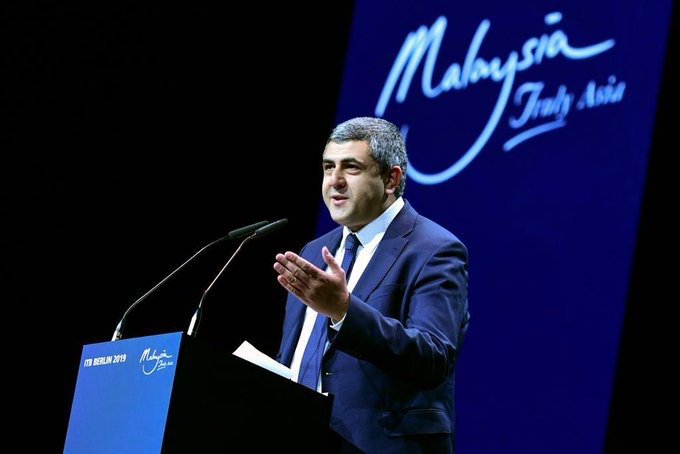On the occasion of the ongoing International Tourism Bourse in Berlin, the Secretary General has an exclusive interview with the ITB Berlin News the official News Publucation for the exhibition.
Below is the interview as published by ITB Berlin News
Exclusive Interview: Secretary-General of the World Tourism Organization (UNWTO) – Zurab Pololikashvili
This is the UNWTO year of education, skills development and jobs, with UNWTO placing special emphasis on this at ITB Berlin. We asked UNWTO Secretary-General Zurab Pololikashvili why it is so important to promote these topics.
Tourism regularly outgrows the world economy (6% against 3.7% in 2018) and provides one in ten jobs around the globe. Our sector also grows faster than global trade and is one of the top four export earners globally.
As the United Nations agency responsible to promote tourism for sustainable development, UNWTO this year looks closely at the need to link education and overall skills development, in order to ensure quality performance and hence sustainable employment in tourism.
ITB BERLIN IS THE PERFECT PLACE TO LAUNCH A NEW REPORT IN WHICH WE LAY OUT 11 STRATEGIES AND 68 MEASURES TO HELP UNDERSTAND AND MANAGE VISITOR GROWTH
As a leading economic sector and employer, tourism needs to prepare for the future of work, particularly in a sector characterized by innovation. This is a shared challenge: public and private stakeholders and education institutions need to work together. UNWTO wants to help ensuring these synergies come to life.
At ITB Berlin, you will be launching a report on women in tourism. Where are we at when it comes to achieving gender equality in this sector?
In many countries, women make up the majority of the workforce and of tourism entrepreneurs. At the same time, women remain concentrated in lower-paid and consequently more vulnerable employment.
But UNWTO research for the Global Report is encouraging, showing that gender roles in the tourism sector are starting to change: More women are working and starting businesses in non- traditional areas, thanks to the rise and accessibility of digital technologies and their applications in tourism. Furthermore, a number of countries have made serious commitments to women empowerment in tourism through gender equality policies and strategies. This is a strong starting point for any progress in this critical area.
Yet again, we will see the Silk Road Ministers’ Meeting at ITB Berlin. How is this initiative progressing?
This meeting has become a permanent feature at ITB Berlin, an achievement that would not have been possible without ITB Berlin’s continued support and dedication. We trust that the Silk Road will become one of the most important transnational tourism routes of the 21st century.
Since 2011, Ministers of Tourism and high level officials from the Silk Road countries, together with representatives of other UN Agencies and the private tourism sector, have been conveying at ITB Berlin to discuss joint tourism strategies aimed at establishing the Silk Road as an internationally renowned and seamless cultural tourism route.
Today, 34 countries from Europe, the Middle East and Asia are cooperating in marketing and promotion, capacity building, tourism research and travel facilitation. Cross-country tourism projects are growing, the interest of trade and consumers in the Silk Road brand continues to grow, and awareness among Silk Road countries regarding tourism’s contribution to cultural preservation, regional cohesion and intercultural understanding is fully established.
Our annual gathering ensures that sustainable tourism development remains on the agenda as a key pillar of inclusive economic growth. Moreover, with rich and authentic maritime and land-based experiences readily available throughout the region, this meeting ensures to preserve the Silk Road momentum and to mobilize technical assistance where it is most needed.
One of the key themes this year at ITB Berlin is overtourism. How is UNWTO working to combat this issue?
Long before the buzzword “overtourism”, UNWTO defined tourism carrying capacity as “the maximum number of people that may visit a tourist destination at the same time, without causing destruction of the physical, economic and sociocultural environment and an unacceptable decrease in the quality of visitors’ satisfaction”.
We are not facing a new challenge, and adequately managing tourism to the benefit of visitors and residents alike has always been a fundamental issue for the sector.
UNWTO is committed to supporting destinations to face up to this governance challenge. That’s why we think that ITB is the perfect place to launch a new report in which we lay out 11 strategies and 68 measures to help understand and manage visitor growth. The report examines how to manage tourism in urban destinations to the benefit of visitors and residents alike and also includes a series of case studies on measures being implemented by cities around the world. It will be presented on 6 March and was produced in collaboration with the Centre of Expertise Leisure, Tourism & Hospitality (CELTH), Breda University of Applied Sciences, and the European Tourism Futures Institute (ETFI) of NHL Stenden University of Applied Sciences.
Essentially, we are talking about the absence of good management and uncontrolled development. With growing tourist numbers, we must look at community engagement, congestion management, reduction of seasonality, careful planning which respects the limits of capacity and the sensitivity of the destination, as well as product diversification.
I WISH TO CONGRATULATE MALAYSIA ON BEING ITB BERLIN’S PARTNER COUNTRY FOR THIS YEAR. MALAYSIA IS A FOUNDING MEMBER OF UNWTO AND ONE OF ITS MOST ACTIVE MEMBERS
This year’s official partner country is Malaysia. What are your thoughts on this nation as a tourist destination? What do you see as being its key “tourism assets”?
I wish to congratulate Malaysia on being ITB Berlin’s partner country for this year. Malaysia is a founding member of UNWTO and one of its most active members, involved at several levels of the Organization’s activities and governing bodies.
Malaysia identi ed tourism as one of the forefront industries in its economy because of tourism’s great potential in job creation, socio-economic development as well as foreign income generation – tourism is currently the 2nd largest foreign exchange earner.
We all know the “Malaysia Truly Asia” tagline, which goes back two decades! Tourist arrivals and receipts have grown strongly since 1999 and transformed Malaysia into a major destination in Southeast Asia.
UNWTO feels very much at home whenever its of cials visit Malaysia – a feeling we share with the more than 25 million plus international tourists who have been ocking to Malaysia’s borders every year since 2010. We have been co- organising the World Tourism Conference every 3 years since 2007. After successfully holding the 4th edition of this conference in Penang in 2016, we are currently in the process of preparing for the 5th edition which will be held in Kota Kinabalu next August.







